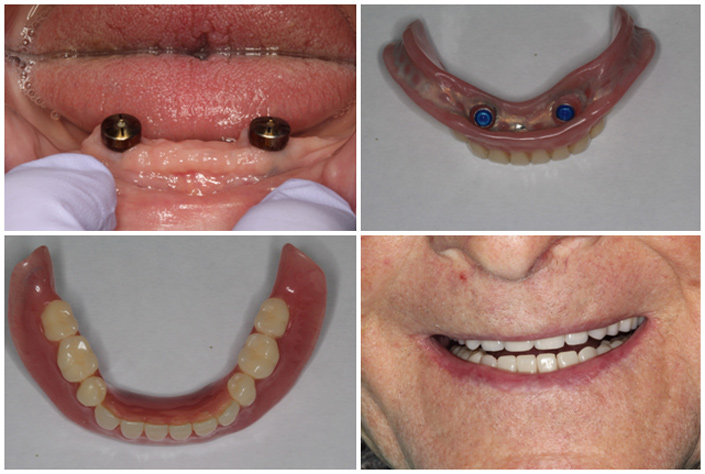Dentures
If you’ve lost some or all of your natural teeth, whether from periodontal disease, tooth decay or injury, partial or complete dentures can replace your missing teeth and your smile. Replacing missing teeth will benefit your appearance, your bite, and your health. Without support from a denture, facial tissues have not support and sag therefore, making a person look older. You’ll be able to eat, speak and smile. All things that are taken for granted until natural teeth are lost.
There are different types of dentures.
Partial Dentures replace multiple missing teeth and are supported with clasps around the remaining teeth and surrounding gums.
Complete Dentures are made when all remaining teeth are removed and tissues have healed. Healing after extractions may take 6-8 weeks.
Immediate Complete Dentures are inserted the same day when remaining compromised teeth are removed. With immediate dentures, the patient leaves with dentures in his mouth. After tissues have healed relines of the dentures are necessary to ensure a good and comfortable fit.
Overdentures are dentures that fit over a small number of remaining natural teeth or implants. These dentures give added support and stability to the denture.
Implant Supported Overdenture:

Even if you wear full dentures, you still must take good care of your mouth. Brush your gums, tongue and palate every morning with a soft-bristled brush before you insert your dentures to stimulate circulation in your tissues and help remove plaque. Always remove your dentures at night to allow the tissues below the dentures to rest and breath.
Scheduling regular dental checkups are still necessary when wearing complete dentures. We will examine your mouth to see if your dentures continue to fit properly and also examine your mouth for any signs of oral diseases including oral cancer.
What will dentures feel like?
New dentures may feel awkward for a few weeks until you become accustomed to them. The dentures may feel loose while the muscles of your cheek and tongue learn to keep them in place.
It is not unusual to experience minor irritation or soreness. You may find that saliva flow temporarily increases. As your mouth becomes accustomed to the dentures, these problems should diminish. One or more follow-up appointments with the dentist are generally needed after a denture is inserted. If any problem persists, particularly irritation or soreness, be sure to consult your dentist.
Will dentures make me look different? Dentures can be made to closely resemble your natural teeth so that little change in appearance will be noticeable. Dentures may even improve the look of your smile and help fill out the appearance of your face and profile.
Will I be able to eat with my dentures? Eating will take a little practice. Start with soft foods cut into small pieces. Chew slowly using both sides of your mouth at the same time to prevent the dentures from tipping. As you become accustomed to chewing, add other foods until you return to your normal diet. Continue to chew food using both sides of the mouth at the same time. Be cautious with hot or hard foods and sharp-edged bones or shells.
Will dentures change how I speak? Pronouncing certain words may require practice. Reading out loud and repeating troublesome words will help. If your dentures “click” while you’re talking, speak more slowly. You may find that your dentures occasionally slip when you laugh, cough or smile. Reposition the dentures by gently biting down and swallowing. If a speaking problem persists, consult your dentist.
Frequent Asked Questions about Dentures
Q. Should I use a denture adhesive?
Denture adhesive can provide additional retention for well-fitting dentures. However, it is not the solution for old, ill-fitting dentures. A poorly fitting denture, which causes constant irritation over a long period, may contribute to the development of sores. These dentures may need a reline or need to be replaced. If your dentures begin to feel loose or causes discomfort, let us know so we can take evaluate them to see what adjustments are necessary.
Q. How do I take care of my dentures?
Dentures are very delicate and can easily break if dropped. When you are not wearing your dentures store them away from small children and pets. Like natural teeth, dentures must be brushed daily to remove food deposits and plaque. Brushing helps prevent dentures from becoming permanently stained and helps your mouth stay healthy. It’s best to use a brush designed for cleaning dentures. A toothbrush with soft bristles can also be used. Use a mild soap or denture cleaning solutions. Avoid using beach or other household cleansers, which may be too abrasive. Toothpaste can create small pores in the denture leading to more stain in the future.
Q. Can I make minor adjustments or repairs to my dentures?
You can damage your dentures and harm your health by trying to adjust or repair your dentures on your own. A denture that is not made to fit properly can cause irritation and sores. Please see us and we will help you!
Q. Will my dentures need to be replaced?
Over time, dentures may need to be relined or remade due to normal wear or changes in your mouth. To reline the denture we use the existing denture and put a material inside to get a better fit with the surrounding tissue. Dentures may need to be replaced if they become loose and the teeth show signs of significant wear or fracture. Dentures can become loose over time since the bone and gums can recede or causing jaws to align differently and the denture to fit more loose. Loose dentures can cause sores and lead compromised chewing. It’s important to replace worn or poorly-fitting dentures before they cause problems.













